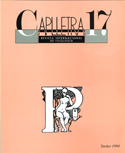La professió de lexicògraf
DOI:
https://doi.org/10.7203/caplletra.17.7399Paraules clau:
lexicografia, lexicògrafs Resum
Resum
At the present time, there is no doubt that lexicography takes up an important place in the field of language Science and that this fact involves the possibility of speaking about the scientific task carried out by properly trained professionals: the lexicographers.
This article reflects on the mentioned subject, paying special attention to the characteristics of the lexicographers’ work.
The first section, From the Amateur to the Professional Lexicography, explains the fact that nowadays lexicography does not remain in the hands of the amateur and the enthusiast, but in those of the professional scientist'. Lexicography has changed from «the art of making dictionaries» to «the Science and the technique of dictionaries».
The second section, The Establishment of the Scientific Lexicography, comments on the importance of the Exeter International Convention of Lexicography (1983), the creation of EURALEX and the union of efforts and research works with the aim of determining the lexicographical science.
The third section focuses explicitly on the several points of the lexicographer’s work. In this central part of the article, lexicography is placed within the limits of applied linguistics and, therefore, they insist on the fact that the lexicographer is not basically a language theorist The basic assignments in the treatment of the subject matters are commented, and the lexicographer's work is related to the rest of the branches of language science and the need to attend to questions that were obviated from dictionaries not long ago; treatment of macro and micro- structure, problems of definition, indications for the use of verbs, noun position and combinatory, etc.
Finally, the importance of the lexicographer in the establishment of language use and the need of collaboration with other specialized professionals is commented, as well as the Computer Services available for those who take up dictionary making.
 Descàrregues
Descàrregues
Descàrregues
Com citar
-
Resum288
-
PDF95
Número
Secció
Llicència
L’autor o autora que adrece un treball a la redacció de Caplletra perquè siga publicat ha de ser la persona titular legítima dels drets d'explotació. La legitimació per a la publicació del treball ha d’incloure també les imatges, les taules, els gràfics i altres materials que puguen complementar el text, amb independència de si n'és l'autor o autora.
Copyright. Quan publica el treball en la revista, l'autor o autora cedeix a Caplletra. Revista Internacional de Filologia els drets d'explotació (reproducció, distribució i comunicació pública), tant per a l'edició impresa en paper com per a la versió electrònica, que serà accessible mitjançant la xarxa Internet.
Tots els treballs publicats en Caplletra es troben sota una llicència Creative Commons del tipus Reconeixement-NoComercial-SenseObraDerivada 4.0.
RESPONSABILITAT
Caplletra. Revista Internacional de Filologia no s'identifica necessàriament amb els punts de vista mantinguts en els treballs que publica.
Caplletra. Revista Internacional de Filologia declina tota responsabilitat derivada de qualsevol vulneració eventual dels drets de propietat intel·lectual que poguera ser duta a terme pels autors o autores.






